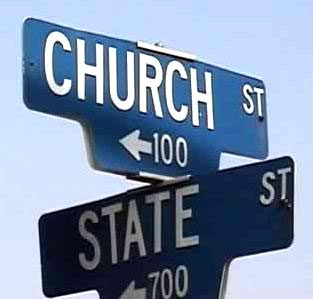
From the time of Constantine the Christian Church has been involved in high level politics. Before that it was simply the victim of those who were, and thereby suffered centuries of persecution; it was little wonder that its leaders sought to avoid a return to that position. In Western Europe in the aftermath of the fall of the Roman Empire, the Church provided an educated elite who could do the sort of things that monarchs needed done if their states were to prosper. Without the Church there really would have been a ‘Dark Age’. Education, literacy, the transmission of the heritage of antiquity to later ages, all of these were the product of the interaction between Church and State. It was not without its costs. The Eastern Roman Empire was in many ways a theocracy, but in the West, the Pope fought, and won, a series of battle with medieval monarchs to avoid the Church falling entirely under their control, even going as far as to excommunicate kings.
It got more complex in the early modern period after the Reformation. Luther and Calvin relied upon the power of monarchs to survive against the power that Rome could bring to bear against them, just as the Pope relied on faithful Catholic monarchs to try to restore order to Christendom. The resulting 30 Years War convinced most rulers that it was best to leave each other free to establish whatever type of Christianity they wanted in their own domains; the longer term result was to convince colonists on the Eastern seaboard of North America to keep State and Church entirely separate.
Across the next few hundred years a clear difference emerged in Western Europe between the Protestant and the Catholic kingdoms. In most of the former, churches took a less prominent role, in the latter it was otherwise. That the latter tended to be poorer, economically more backward and more authoritarian allowed historians to argue a connection between Protestantism and the success of capitalism, whilst identifying Catholicism with deepest reaction, rural poverty and authoritarianism. One of the many reasons the Ulster Protestants did not want a united Ireland was the fear that ‘Home Rule’ meant ‘Rome rule’ – with all the dire consequences that was thought to bring.
From at least the time of the French Revolution, the Catholic Church found itself under the sort of assault it had not had since the dark days of Diocletian. When, recently, President Hollande said something about the traditions of the republic in the context of the murder of Fr Hamel, those of us who knew anything about how the founders of the French republic treated priests and monks and nuns had to suppress the urge to complain at his myth making. Under such assaults the Church took its protectors where it could. Sometimes these were not very good friends to have. It was natural for the Church to support Franco in Spain, as he stood against the Communists who were trying to destroy the Church. In the post Second World War period the Church tended to support Christian Democratic parties in Western Europe as an alternative to seeing Communism spread. In some parts of Europe, Malta and Ireland being obvious examples, but Spain and Portugal not being far behind, the Church continued to have huge political influence. It is by no means clear that that worked to the advantage of either Church or State, as it has left a legacy which allows the opponents of the faith to cherry-pick examples of the Church behaving in ways it should have shied away from, not least in the matter of clerical sex abuse.
On the whole America managed this better, and, counter intuitive though it might seem, Christian Churches had more political influence in American elections than they did in most European ones. That model, of standing outside direct political participation but advising your flocks still seems to me the best one we have. But when it comes to thinking that any one candidate is somehow going to do ore for the Church than another, the best motto is the ancient one – do not put your trust in princes. It is better to have a politician who understands faith than one who does not – beyond that we can hope for little more.

Theocracy, of course, is a major difference between the OT and the NT, although the question was already being discussed in the time of Ezra. I sometimes wonder whether Byzantium would have survived the Arab and Turkish invasions if the emperor had not been embroiled in Church controversy. But then, some other excuse would have been found to withdraw from Constantinople.
LikeLiked by 1 person
sir i read your article iam intrested to know more about this pls sent me some books which tells about this point……..
On Tue, Aug 30, 2016 at 5:31 PM, All Along the Watchtower wrote:
> chalcedon451 posted: ” From the time of Constantine the Christian Church > has been involved in high level politics. Before that it was simply the > victim of those who were, and thereby suffered centuries of persecution; it > was little wonder that its leaders sought to avoid a ” >
LikeLike